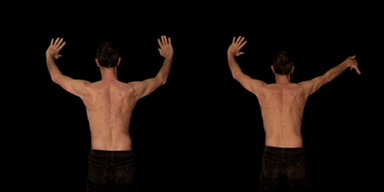STEVE PAXTON
PEOPLEText: Wakana Kawahito

Phantom Exhibition, Steve Paxton with Florence Corin and Baptiste Andrien (Contredanse).
Photo: Contredanse (Florence Corin and Baptiste Andrien)
Do you have anything you are interested in except dance and farming?
The human brain, environmental issues, art – such as paintings, performance, music, etc.
Could you let me know some names of you are interested in?
A Canadian environmentalist, Dr. David Suzuki; a Spanish Judge, Baltasar Garzo; a Chief Prosecutor of the International War Crimes Tribunal, Louise Arbour; and a Canadian Politician, Stephen Lewis.
There is lots of improvisation in your work. What do you think about improvisation?
It is life itself. For instance, there is a lot of improvisation in sports. In the case of soccer, it is necessary to improvise within a rule because many adults follow the rule. Improvisation makes your body move, not just think in your head.
Today, I heard one of the better definitions of improvisation from Robart Frith, a jazz musician on the radio. He said that improvisation is the assumption of innocence in the context of experience.
I thought that it was a very interesting definition…sort of explains why it is so interesting. Okay, you have context, which is the conservative element; such as memories and experiences, but the assumption of innocence is childhood. I’ve been dancing for fifty years, and I’m still interested in moving on progressively.
How much do you improvise on stage?
It’s not how much I improvise, but in what way I improvise.
So, since the 1970’s I’ve been testing my idea in my dance almost scientifically. I could say that I am a researcher. For instance, for C.I. I am researching weight and reflection. I was dancing with various styles, like collaborations with other dancers, musicians, and solo dance. With one body, one space, one night and little music, I have been trying what I can do, as everything only has one chance.
When it comes to time, you might think of the concept of time. There are many philosophies about time, but it is hard to be practical with the idea that you only are alive in this moment; we all are simply projecting the future and carrying the past. Right there in the middle exists right now, which needs exercise too.
Are there any reasons you set one hour for taking a nap in the workshop?
My workshop’s exercise deals with coordination, which is strange to the body, as it has nothing to do with ordinal movement. Naps are necessary because the part of brain that actually does the movement, which is unconsciousness, can learn the movement. Get consciousness out of the way by putting it to sleep.
Steve Paxton+Lisa Nelson Project
Steve Paxton 10 days Workshop “Material for the Spine”
Date: April 26th – May 5th, 2009
Place: Graduate School of Film and New Media, Tokyo University of the Arts
https://ddjc2009.org
Steve Paxton “Phantom Exhibition – Material for the Spine”
Date: May 24th – August 31st, 2009
Open: 10:00 – 19:00 (Closed on Tuesdays)
Place: Yamaguchi Center for Arts and Media [YCAM]
Address: 7-7 Nakazono-cho, Yamaguchi
Tel: +81 (0)83 901 2222
Admission Free
https://www.ycam.jp
Text: Wakana Kawahito





